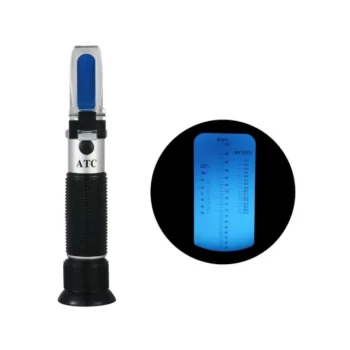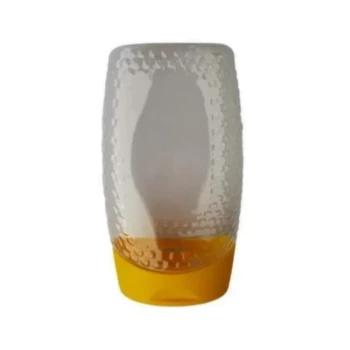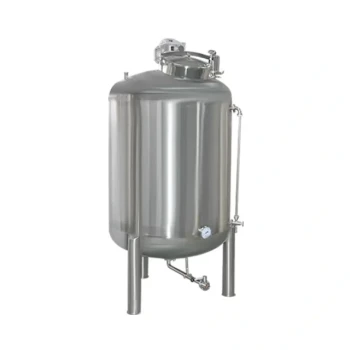In short, extracting uncapped honey leads to fermentation. This is because the honey has not been fully "ripened" by the bees, meaning its water content is too high. This excess moisture allows naturally occurring yeasts to multiply, spoiling the honey and rendering it unsellable for consumption.
The wax cap on a honeycomb is the bees' signal that the honey is ready for long-term storage. Harvesting uncapped, or "green," honey bypasses this critical quality check, introducing excess water that will inevitably lead to spoilage.
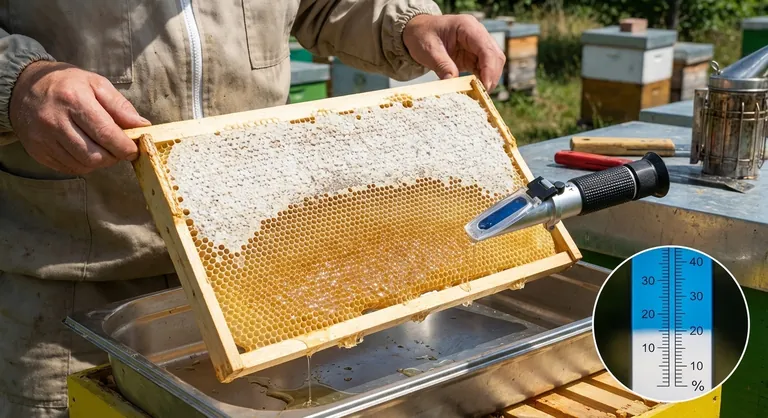
Why Bees Cap Honey: The Science of Ripening
To understand the problem with uncapped honey, you first need to understand why bees cap it at all. It's a precise and vital step in ensuring the honey's stability.
From Nectar to Honey: The Dehydration Process
Honey begins as nectar, which is about 80% water. Bees transport this nectar to the hive and begin a process of dehydration.
They pass the nectar from bee to bee, adding enzymes, and fan their wings over the open cells. This evaporates the water until its content drops below a critical threshold.
The Wax Cap: A Seal of Approval
Once the water content is reduced to approximately 18.6% or lower, the bees consider the honey "ripe." They then secrete a wax capping over the cell.
This wax seal is airtight and watertight. It protects the finished honey from absorbing ambient moisture and from contamination, preserving it almost indefinitely.
Uncapped Honey: "Green" and Unstable
Uncapped honey is simply honey that has not yet completed this dehydration process. It's often called "green" honey.
Its water content is still too high, making it an unstable product that is not ready for storage.
The Consequences of Extracting Unripe Honey
Extracting this "green" honey might seem like a way to get a larger harvest, but it introduces a critical flaw into your final product that can ruin the entire batch.
The Inevitable Fermentation
All raw honey contains wild, sugar-tolerant yeasts (osmophilic yeasts). At low water levels (below 18.6%), these yeasts remain dormant.
When you extract uncapped honey with a higher water content, you create the perfect environment for these yeasts to activate. They begin consuming the sugars in the honey, producing alcohol and carbon dioxide. This is fermentation.
What Fermented Honey Looks and Tastes Like
Fermented honey will develop a sour, alcohol-like taste and a foamy or bubbly appearance. It is not the same as mead, which is made through a controlled fermentation process.
This honey is considered spoiled and is not suitable for sale or for most culinary uses.
Risking the Entire Batch
The biggest danger is mixing uncapped honey with your properly ripened, capped honey. Even a small amount of high-moisture honey can raise the average water content of the entire storage tank.
This can cause your entire multi-gallon batch to begin fermenting days or weeks after extraction, leading to a significant loss.
Common Pitfalls and Practical Solutions
In the real world, not every frame is perfectly capped. Knowing how to handle these situations is the key to a successful harvest.
The "80% Capped" Rule of Thumb
Many beekeepers follow a guideline: if a frame is 80-90% capped, it is generally considered safe to harvest. The assumption is that the small amount of uncapped honey on the frame is close enough to being ripe.
You can also give the frame a sharp shake (over the hive). If nectar or thin honey drips out, it is definitely not ready. If nothing comes out, it is likely safe.
For Absolute Certainty: Use a Refractometer
The only way to know the exact water content of your honey is to use a honey refractometer. This simple tool requires only a single drop of honey to give you a precise reading.
Professional beekeepers rely on refractometers to ensure every batch meets the standard (under 18.6% water) for quality and stability.
What to Do with Partially Capped Frames
If you have frames with large patches of uncapped honey, you have a few options. You can leave them in the hive for the bees to finish.
Alternatively, you can extract the capped and uncapped sections separately. The honey from the capped cells will be stable, while the uncapped honey should be stored in a freezer or used immediately for baking or mead making.
Making the Right Choice for Your Harvest
Your approach to uncapped honey should depend entirely on your goal for the final product.
- If your primary focus is high-quality, shelf-stable honey: Wait until frames are at least 80% capped, and verify your final batch with a refractometer to ensure water content is below 18.6%.
- If your primary focus is maximizing yield and you need to harvest early: Extract capped and uncapped frames separately. Only bottle and store the honey from fully capped sections, and use the uncapped honey immediately or freeze it to prevent fermentation.
Ultimately, respecting the bees' own quality control process is the surest path to producing excellent honey.
Summary Table:
| Key Factor | Why It Matters | Ideal Target |
|---|---|---|
| Water Content | Determines risk of fermentation by wild yeasts. | Below 18.6% |
| Wax Capping | The bees' signal that honey is ripe and stable. | Frames at least 80% capped |
| Refractometer | The only tool for precise measurement of water content. | Essential for professional beekeepers |
Protect Your Profits with Professional-Grade Equipment
Don't let a spoiled harvest impact your bottom line. HONESTBEE supplies commercial apiaries and beekeeping equipment distributors with the durable, reliable tools needed for a perfect harvest every time.
From honey refractometers for precise quality control to heavy-duty extractors built for volume, our wholesale-focused operations ensure you get the equipment your business depends on.
Contact our commercial sales team today to discuss your equipment needs and secure stable, high-quality yields.
Visual Guide
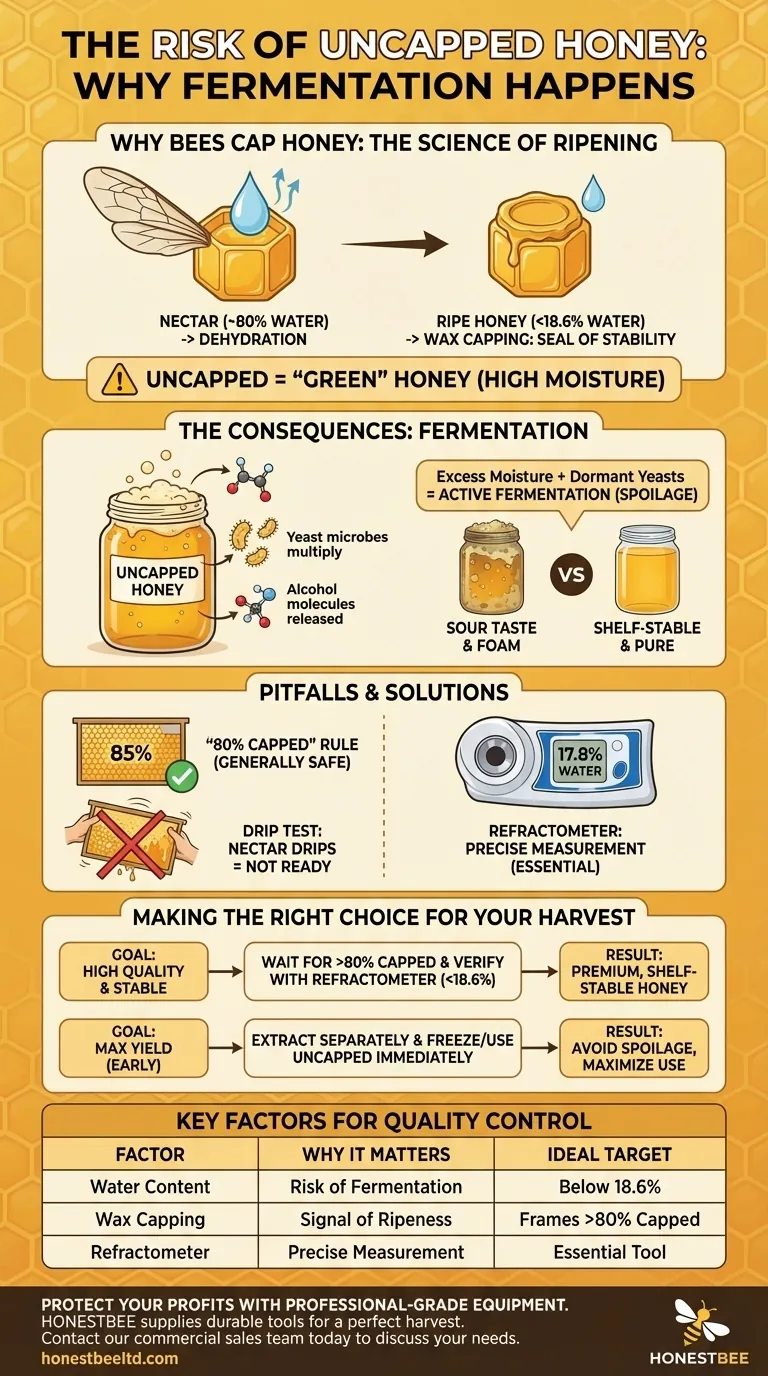
Related Products
- Precision Honey Refractometer Instrument for Quality Assessment
- HONESTBEE 3-Frame Manual Acrylic Honey Extractor
- Stainless Steel 3 Frame Manual Honey Extractor Spinner for Bee Honey Extraction
- Inverted Squeezable Honey Jar with No Drip Flip Top Cap for Easy Pouring
- 6 Frame Manual Stainless Steel Honey Extractor Beekeeping Equipment
People Also Ask
- What role does a high-precision refractometer play in honey moisture analysis? Ensure Honey Quality & Stability
- Why is a laboratory benchtop refractometer essential for honey? Secure Stability & Quality
- What should be considered regarding the measurement range of a honey refractometer? Ensure Peak Honey Quality
- What is the function of a honey refractometer in beekeeping? Ensure Harvest Quality and Prevent Fermentation
- How is a manual refractometer used to determine honey quality? Essential Moisture Control for Commercial Beekeeping
